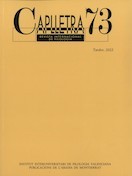Discovery-learning in grammar education: a study on anaphoric pronouns
DOI:
https://doi.org/10.7203/caplletra.73.24639Keywords:
anaphoric pronouns, discovery-learning, grammar laboratory, explicit knowledge of language Abstract
Abstract
In the last decades, in the Portuguese educational context, as in other countries, grammar has been a central topic of debate in L1 education. Since 2001, a perspective of grammar education as explicit knowledge of language has prevailed in the Portuguese L1 curriculum. From this perspective, inspired by proposals of the Anglo-Saxon movement of language awareness, the main goal of grammar education is to develop the implicit knowledge that children already have and use into an increasingly reflected and explicit knowledge. In this conception, which supposes that «most of data needed to teach grammar is in children’s heads» (Hudson 1992), discovery-learning approaches seem to be particularly adequate. Founded by Bruner and brought into grammar education by Hudson, this learning approach gives the student a central role and reflection upon language is stimulated through scientific reasoning. In this article, we will refer to a study on the comprehension of anaphoric pronouns in which a discovery-learning approach, the «grammar lab», was used with 20 students in grade 4. Proposed by Duarte (1992, 2008) after Hudson (1992) and sharing characteristics with other approaches (e.g., the «linguistic inquiry» by O’Neil and colleagues), the grammar lab allows students to use their intuitive knowledge and guides them to observe linguistic data, to test and validate hypotheses about language. In our study, which investigated relations between explicit knowledge and reading, students were guided to reflect upon different properties of anaphoric pronouns to develop strategies to identify antecedents of pronouns in a reading task. Some of the materials used will be presented and the main results obtained, which show positive effects of this approach in grammar education, will be discussed.
 Downloads
Downloads
Downloads
Published
How to Cite
-
Abstract360
-
PDF554
Issue
Section
License
Authors submitting work to Caplletra for publication must be the legitimate holder of the usage rights. Legitimacy for the purposes of publishing the work must also include images, tables, diagrams and any other materials that may complement the text, whether they are the author of such material or not.
Copyright: on publishing their work in the journal, the author grants Caplletra. Revista Internacional de Filologia usage rights (reproduction, distribution and public communication) for both the paper printed version and for the electronic version.
All work published in Caplletra is covered by the Creative Commons license type Attribution-NonCommercial-NoDerivatives 4.0 (CC BY-NC-ND 4.0).
RESPONSABILITY
Caplletra. Revista Internacional de Filologia does not necessarily identify with the points of view expressed in the papers it publishes.
Caplletra. Revista Internacional de Filologia accepts no responsibility whatsoever for any eventual infringement of intellectual property rights on the part of authors.






